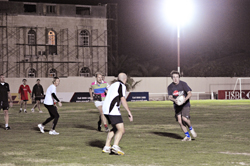
By Mai Al Khatib-Camille

THE news motorsport fans and business leaders had dreaded became a reality on Monday evening when the Bahrain International Circuit (BIC) announced that the Kingdom of Bahrain would withdraw from hosting the opening race of this year's F1 Grand Prix season.
The decision was made so that the country could 'focus on its process of national dialogue' after anti-government protests led to deadly clashes with police and the army.
Last Friday, His Royal Highness Prince Salman bin Hamad Al Khalifa, Crown Prince and Deputy Supreme Commander, initiated a new national dialogue involving all sections of Bahraini society in order to resolve the current political situation. He informed Formula One supremo Bernie Ecclestone of the BIC's decision by telephone.
The eighth Gulf Air Bahrain Grand Prix was due to take place from March 11-13. HRH Prince Salman said: "At the present time the country's entire attention is focused on building a new national dialogue for Bahrain.
"Although Bernie Ecclestone had graciously made clear that a decision on the race was entirely Bahrain's to make and was not yet required, we felt it was important for the country to focus on immediate issues of national interest and leave the hosting of Bahrain's Formula 1 race to a later date.
"I would like to extend my personal gratitude to Bernie Ecclestone for his support and understanding.
"After the events of the past week, our nation's priority is on overcoming tragedy, healing divisions and rediscovering the fabric that draws this country together; reminding the world of the very best that Bahrain is capable of as a nation once again united."
BIC chairman Zayed R Al Zayani said: "Bahrain's Grand Prix is a time of celebration and hosting the race is a source of great pride for Bahrain and Bahrainis. It is a showcase to the world and we look forward to welcoming the teams and drivers and everyone involved in Formula One back to Bahrain in the very near future.
"I hope that F1 and our friends around the world will understand our decision at this difficult time."
Following the Crown Prince's decision, Ecclestone said: "It is sad that Bahrain has had to withdraw from the race, we wish the whole nation well as they begin to heal their country.
"The hospitality and warmth of the people of Bahrain is a hallmark of the race there, as anyone who has been at a Bahrain Grand Prix will testify. We look forward to being back in Bahrain soon."
Earlier on Monday, Formula One cancelled a scheduled testing session in Bahrain. Barcelona's Catalunya Circuit said it would be ready to stage the final pre-season test session if the kingdom was unable to host it. From that moment the kingdom's season-opening Grand Prix was under severe threat.
The season will now get underway with the Australian Grand Prix in Melbourne on March 27.
Red Bull driver Mark Webber was among those to have voiced reservations over staging the opener in Bahrain. "When you hear of people losing their lives, this is a tragedy," the Australian said. "It's probably not the best time to go there for a sporting event. They have bigger things, bigger priorities."
A later report on the BBC quoted an unnamed F1 team saying that to let the Gulf Air Grand Prix go ahead as planned would be 'incendiary' to the delicate political situation in Bahrain.
The GP2 Series and supporting races scheduled to take place in Bahrain last weekend were also cancelled.
To make matters worse the foreign offices in many countries advised citizens against traveling to the island.
Reports state that Bahrain paid $40 million for the Grand Prix, plus $20 million for the privilege of hosting the season opener.
Cancellation is a blow for both the sport and the kingdom, which became the first Middle Eastern country to host a round of the championship in 2004 in an attempt to transform itself into a tourist destination as well as a business hub.
Although there are some vocal critics of the money spent on the circuit and the cost of staging the race, no-one can doubt the immense economic impact of the Gulf Air Bahrain Grand Prix.
For example, income from the event was a major contributor to the estimated $4.6 billion Bahrain made from tourism in 2008. Also, research from more than 1,000 organisations found that local and regional businesses contributed almost $30 million, from marketing, event infrastructure and operational costs.
Bahrain benefited to the tune of $116.8 million from visitor spending on accommodation, food and drink, retail outlets, travel services (including airline and car rental) and other products and services.
The race also generated $13.8 million in ticket sales and $36.7 million from fans buying food, drink and merchandise at the BIC.
More than $7.7 million was raised through the selling of television rights, commissions, facility rentals, sponsorship referrals and catering commissions.
A total of 76 per cent of visiting spectators travelled by plane, with almost half using Bahrain's flag-carrier, Gulf Air.
A total of 586 jobs were created by the race directly and indirectly - up 46 per cent from 2007. A survey of 67 hotels and resorts also showed occupancy rates during the period ranged from 75 per cent to 100 per cent.
Although no official decision has been made on a new date for the rescheduling of the race in Bahrain, insiders suggest that the event is likely to be rescheduled towards the end of the season, probably taking place after the Grand Prix in Abu Dhabi and before the final race of the season in Sao Paulo, Brazil, in November.











